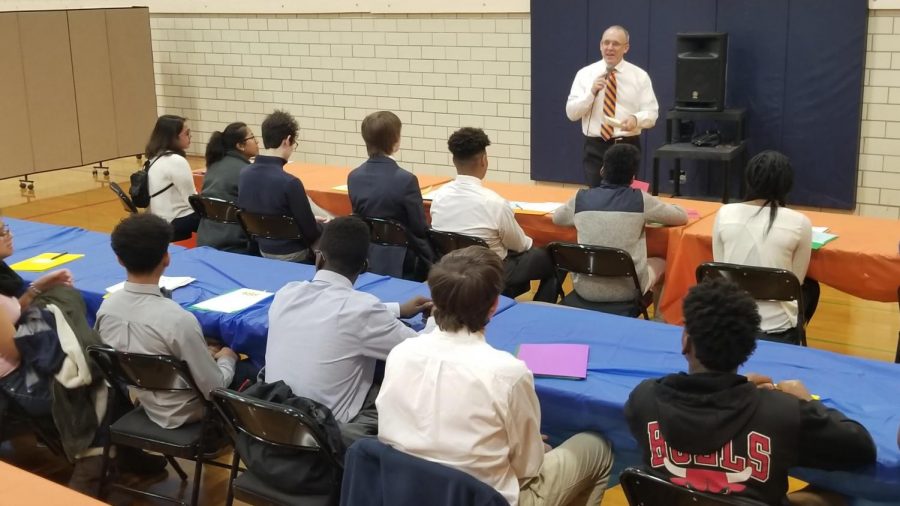Evanston teens seek alternatives to summer of canceled activities
Evanston mayor Steve Hagerty addresses participants at the 2018 Mayor’s Summer Youth Employment Program job fair. This year the program was held virtually for students who have not heard back from employers.
July 14, 2020
Anna Wittcoff should have been a counselor at two summer camps: an overnight one in Wisconsin and an art camp in Evanston. But this May, she received news that both camps were canceled for the summer.
“I was bummed at first as I love being a camp counselor,” said Wittcoff, a SESP freshman and a recent graduate of Evanston Township High School. “I tried to be optimistic about it and moved to a mindset of ‘Okay, I have all this free time, what am I going to do to make the best out of my summer?’”
Across the country, many teenagers, like Wittcoff, have had to cancel or modify summer plans due to the pandemic. Summer camps that chose to reopen had to close down due to a spike in COVID-19 cases on-site. Consequently, Evanston teenagers have been looking at alternate activities to fill their summer days.
Wittcoff turned to her neighbors for employment opportunities. Since the beginning of summer, she has been babysitting children and tutoring middle schoolers in her neighborhood while following the U.S. Centers for Disease Control and Prevention’s COVID-19 guidelines.
“We’re outside for most of the day,” said Wittcoff. “We take our dogs on walks. We’ve been doing slip ‘n slide and water balloons. For the tutoring, (it is the) same thing as (before), we just have to be apart and both wear masks.”
ETHS senior Elisa Walker does not have a job and while she has more time now, she is also less financially independent from her parents. Walker has instead been participating in the mayor’s Summer Youth Employment Program, a paid virtual training program by the city.
Walker also spends much of her time practicing volleyball with her school’s team, which she has been a part of since her freshman year.
“We have to wear masks the whole time,” Walker described practicing with the team, which meets four days a week. “It’s hard. But I’d rather do that then not practicing at all. You kind of get used to it.”
Walker has organized conversations around diversity within her volleyball team. Following social distancing guidelines, Walker meets with her teammates in their backyards to discuss their shared experience of being black female athletes on the team.
“There’s always been an issue with diversity and how our team works,” said Walker. “That’s our time where we build relationships with each other and have a safe space to speak on anything involving race and relationships.”
Some teenagers have still retained a steady summer job. The University of Illinois at Urbana-Champaign freshman and ETHS graduate Grant King has kept his lifeguard position because the city opened up its beaches at the beginning of July. Beachgoers are required to maintain a six-foot distance and wear face coverings when interacting with staff.
“The locals are pretty understanding of the new policies,” said King. “Luckily, the patrons I’ve spoken with — they’re open-minded, and they understand that the global pandemic is very serious.”
Being outside means increasing the chance for exposure to COVID-19. Although being at a beach is not considered a high-risk activity, King, whose father is at risk, takes extra precautions.
“I have to be aware of working with my fellow lifeguards,” said King. “I don’t want to put my family in jeopardy.”
Email: [email protected]
Twitter: @qthefam
Related Stories:
— Northwestern students adapt to new circumstances for summer internships
— Students turn to remote classes due to fewer summer opportunities
— As D65 looks to the fall, parents of at-risk students say there are no good options


